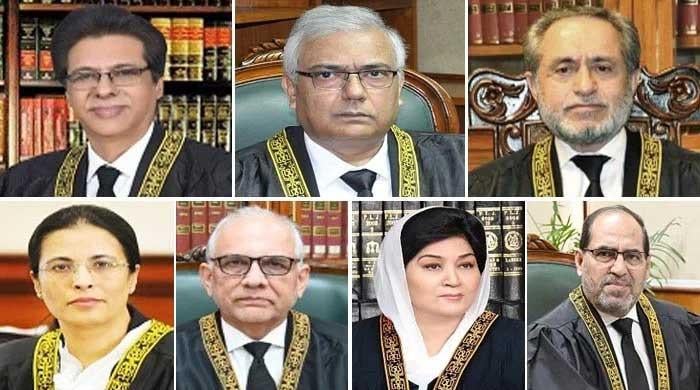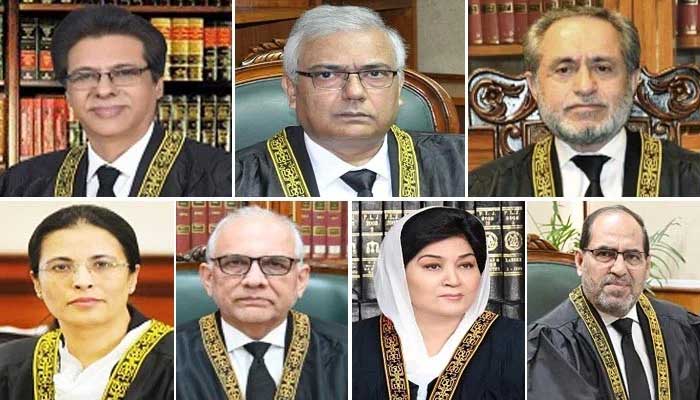ISLAMABAD: The Supreme Court’s seven-member constitutional bench on Monday commenced proceedings of various pending cases.
Led by Justice Amin-ud-Din Khan, the bench includes Justice Ayesha Malik, Justice Muhammad Ali Mazhar, Justice Hassan Azhar Rizvi, Justice Jamal Khan Mandokhail, Justice Naeem Akhtar Afghan and Justice Musarrat Hilali.
Taking up a petition seeking to declare candidates receiving over 50% of votes as successful in elections during the hearing today, the court dismissed the plea and slapped a Rs20,000 fine on Advocate Chaudhry Akram for filing a “frivolous” petition.
Justice Mazhar questioned under which constitutional provision a candidate must secure 50% of votes to win. He emphasised that election outcomes are determined by the votes cast.
Justice Ayesha asked which fundamental right of the petitioner was violated and which constitutional provisions were being breached. She added that the Supreme Court does not have the authority to legislate new laws.
The petitioner argued that Parliament decides the course of people’s lives, to which Justice Khan responded that Parliament does not make such decisions.
Justice Hilali remarked that everyone has the right to vote but noted that people often watch television on polling day instead of voting. She stated that if voters fail to cast their votes, it reflects their own shortcomings.
Justice Mandokhail inquired if the petitioner had cast their vote in the February 2024 election. When the petitioner admitted they had not, Justice Mandokhail remarked that such behaviour disrespects the Constitution.
The bench then imposed a Rs20,000 fine for frivolous litigation, with Justice Khan dismissing the petitioner’s suggestion of a Rs100 billion penalty to reduce the national debt, pointing out the petitioner’s inability to pay such an amount.
Independent candidates’ party affiliation
The seven-member bench also heard a plea regarding making it mandatory for independent candidates to join political parties. The petitioner appeared before the bench via video link.
Justice Khan remarked that the permission granted to the petitioner to appear on court premises should suffice. The petitioner acknowledged that the matter had already been resolved, rendering their appeal ineffective.
Subsequently, the constitutional bench dismissed the petition on the grounds of ineffectiveness.
Tax law compliance
During the hearing on a plea challenging the Income Levy Tax Act 2013, the Federal Board of Revenue’s (FBR) counsel said many parties involved in the cases have not received notices.
The lawyer added it might have been possibly due to incorrect addresses for around 400 individuals. The court directed that notices be served through advertisements in newspapers to ensure compliance.
Scheduled cases
On November 20, the proceedings will include a petition filed by the Pakistan Tehreek-e-Insaf (PTI) challenging Sections 74 and 75 of the Sindh Local Government Act 2013, along with Section 18 of the Sindh Building Control Ordinance 1979.
Another case involves a petition by Muttahida Qaumi Movement-Pakistan (MQM-P) Convener Khalid Maqbool Siddiqui against the conduct and results of the 2017 Population and Housing Census.
The bench will also address suo motu notices on the transfer of the Islamabad Inspector General of Police (IGP) on political grounds and the supply of drugs in educational institutions.
Moreover, the bench will hear Justice Farrukh Irfan Khan’s petition regarding judges’ seniority in the Lahore High Court, and a case opposing the designation of the Sunni Ittehad Council as a parliamentary party.
The bench, on November 21, will hear a constitutional petition against child trafficking and abduction, alongside a challenge to the constitutionality of the commission established on audio leaks, filed by former Supreme Court Bar’s Abid Zuberi.
It will also address a suo motu notice on the poor condition of public schools in Khyber Pakhtunkhwa and Hamza Shahbaz’s petition against PTI’s Chaudhry Parvez Elahi.
Furthermore, a case regarding the disqualification of Sindh Chief Minister Murad Ali Shah, filed by Syed Mehmood Akhtar Naqvi, and a petition regulating the powers of high court chief justices will also be heard.
On November 22, the bench will take up a constitutional petition concerning the alarming state of forests across Pakistan and a case regarding the utilisation of foreign aid during the 2005 earthquake.
It will also hear petitions challenging appointments in the Sindh High Court and judiciary as unlawful and regarding the implementation of right-to-information laws.


